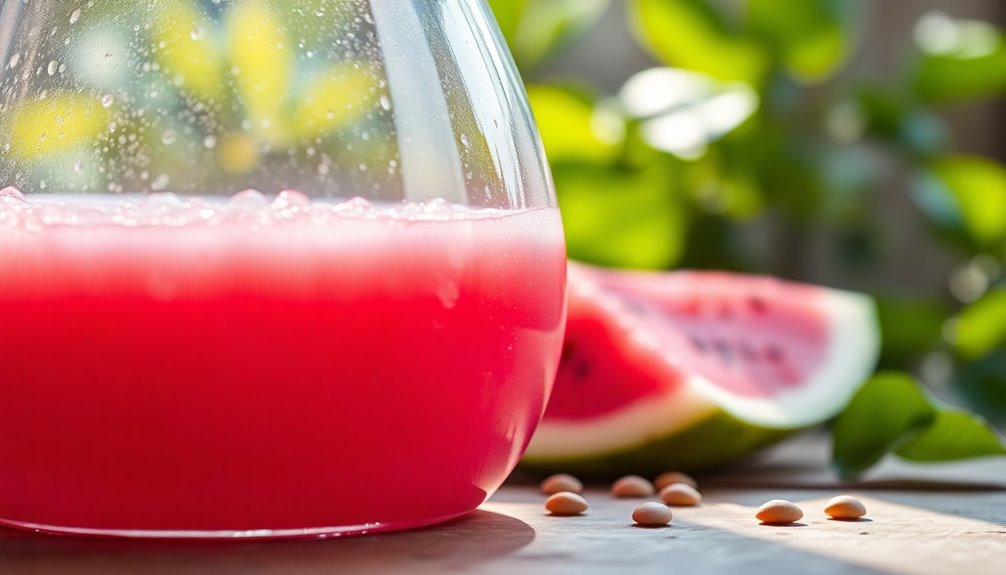Fresh watermelon juice typically lasts about 2-3 days in the fridge. To enjoy the best flavor and quality, try to consume it within 24 hours. If you leave it at room temperature, it should be consumed within 2 hours to prevent spoilage. If you notice any odd smell, discoloration, or visible mold, it's time to toss it. Want to learn how to store it for longer? There's more useful information ahead!
Key Takeaways
- Fresh watermelon juice lasts about 2-3 days when stored in the refrigerator.
- For optimal flavor and quality, consume the juice within 24 hours.
- It should not be left at room temperature for more than 2 hours.
- Signs of spoilage include odd smell, discoloration, and visible mold.
- Discard any juice showing spoilage to avoid health risks.

When you enjoy a refreshing glass of watermelon juice, you might wonder how long it stays fresh. Fresh watermelon juice is a delightful treat, especially during those hot summer days. However, it's important to know how to store it properly to keep it tasting its best.
Typically, when you've just made a batch of this delicious beverage, it'll last about 2-3 days when stored in the refrigerator in an airtight container. But for optimal flavor and quality, it's recommended that you consume it within 24 hours. This way, you can fully appreciate the sweet and juicy essence of fresh watermelon.
If you ever find yourself with leftover juice, you should be cautious about how long you leave it out. Watermelon juice shouldn't be left at room temperature for more than 2 hours, as this can significantly increase the risk of spoilage.
Pay attention to the signs of spoilage, which include an odd smell, discoloration, or visible mold. If you notice any of these signs, it's best to discard the juice to avoid any health issues.
You might be wondering how you can extend its shelf life if you have more juice than you can drink. One effective way is to freeze watermelon juice. When you freeze it in airtight containers or even ice cube trays, the juice can last up to 16 months!
This is a fantastic option if you want to enjoy that refreshing summer beverage long after the season has passed. Just be sure to leave a little space at the top of your containers, as liquids expand when frozen.
When you decide to thaw frozen watermelon juice, you'll want to do so in the refrigerator or using cold water to maintain its freshness. It's important to note that once thawed, you should consume it within a few days, just like freshly made juice.
Although freezing can change the texture slightly, the flavor usually remains intact, allowing you to enjoy that fruity goodness whenever you like.
Frequently Asked Questions
How Do You Preserve Homemade Watermelon Juice?
To preserve your homemade watermelon juice, store it in an airtight container, preferably a lidded glass jar. This helps minimize oxidation and keeps the juice fresh.
If you're planning to drink it soon, refrigerate it and aim to finish it within the first 24 hours for the best taste.
For longer storage, freeze the juice in ice cube trays or freezer-safe containers, leaving space for expansion as it freezes.
Always check for spoilage before consuming.
Does Watermelon Juice Get Spoiled?
Yes, watermelon juice can spoil. If you notice an odd smell, discoloration, or visible mold, it's time to toss it out.
You should also be cautious if it's been left at room temperature for over two hours, as bacteria can grow quickly.
Always store your homemade juice in an airtight container in the fridge and check for any spoilage signs before consuming it, especially after a couple of days.
Stay safe!
Can You Drink Overnight Watermelon Juice?
Drinking overnight watermelon juice can feel like rolling the dice. If you've stored it properly in an airtight container and kept it in the fridge, it might still be okay.
However, always check for signs of spoilage—an odd smell or discoloration means it's time to toss it.
For the best taste and nutrition, it’s really best to enjoy that fresh juice within 24 hours of making it. This is because the nutrients in fresh juice can begin to degrade quickly due to exposure to air and light. If you’re wondering “how long does fresh juice last,” it’s generally recommended to consume it as soon as possible for optimal health benefits. However, if you need to store it, make sure to keep it in an airtight container in the fridge and aim to drink it within 48 hours for the best flavor and nutritional value.
Stay safe and savor every sip!
Can I Freeze Fresh Watermelon Juice?
Yes, you can freeze fresh watermelon juice! Just pour it into airtight containers or ice cube trays, leaving some room for expansion.
This way, you'll have convenient portions ready for smoothies or slushies later. While frozen juice can last up to 16 months, it's best to consume it within 30-60 days for optimal flavor.
Always check for any off smells or discoloration before enjoying your thawed juice to ensure it's still good.
Conclusion
In conclusion, fresh watermelon juice won't last long, usually only about 3 to 5 days in the fridge. To keep it as refreshing as a cool breeze on a hot summer day, store it in an airtight container. If you notice any off smells or changes in color, it's best to toss it out. Remember, just like the last slice of pizza at a party, you want to enjoy it while it's still fresh!
Cindy thoroughly researches juicing trends, techniques, and recipes to provide readers with practical advice and inspiration. Her writing style is accessible, engaging, and designed to make complex concepts easy to understand. Cindy’s dedication to promoting the advantages of juicing shines through her work, empowering readers to make positive changes in their lives through the simple act of juicing.











